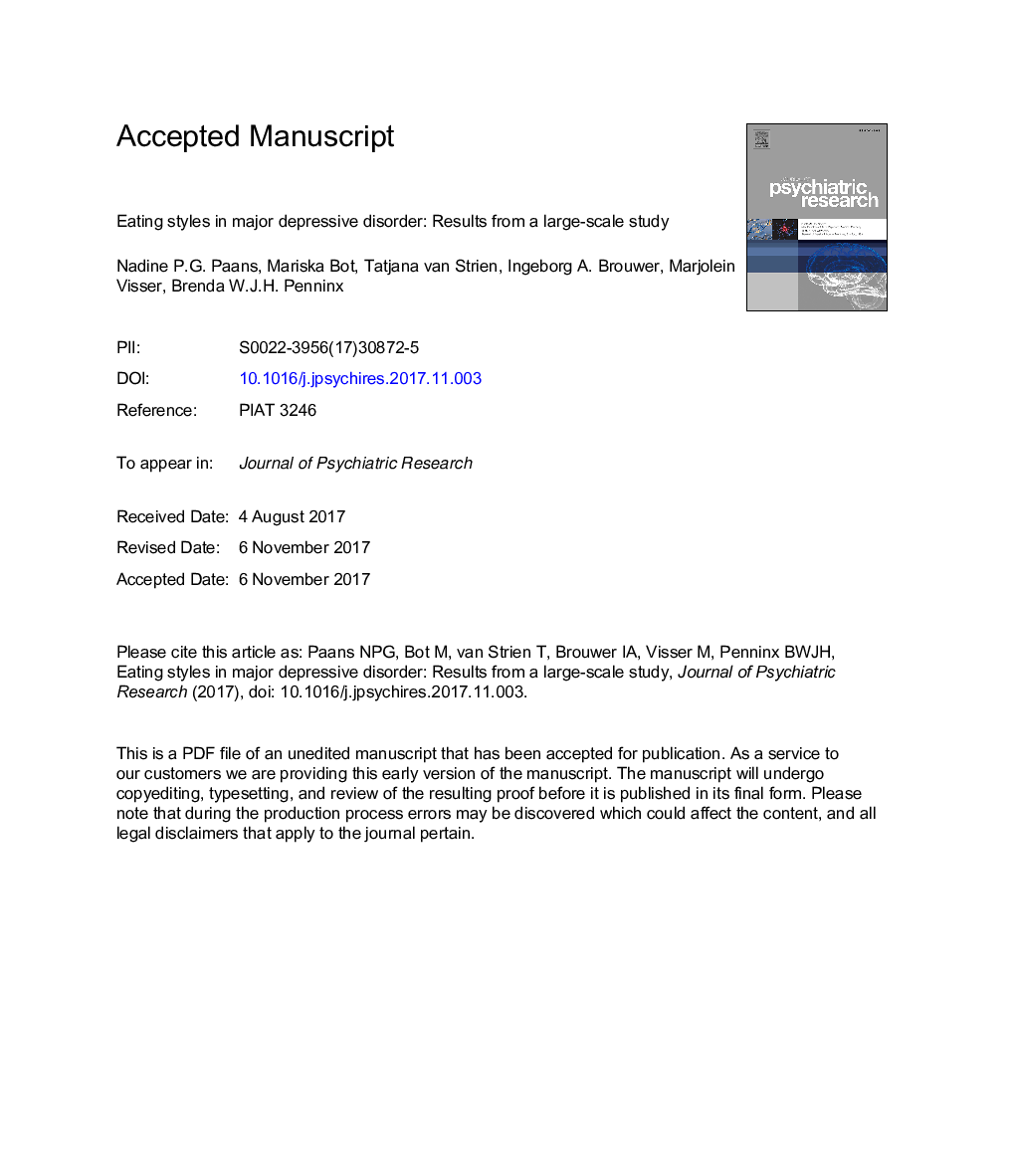| کد مقاله | کد نشریه | سال انتشار | مقاله انگلیسی | نسخه تمام متن |
|---|---|---|---|---|
| 6799709 | 1433296 | 2018 | 37 صفحه PDF | دانلود رایگان |
عنوان انگلیسی مقاله ISI
Eating styles in major depressive disorder: Results from a large-scale study
ترجمه فارسی عنوان
سبک های خوردن در اختلال افسردگی عمده: نتایج یک تحقیق در مقیاس بزرگ
دانلود مقاله + سفارش ترجمه
دانلود مقاله ISI انگلیسی
رایگان برای ایرانیان
کلمات کلیدی
اختلال افسردگی، علائم افسردگی، خوردن احساسی، خوردن خارجی،
موضوعات مرتبط
علوم زیستی و بیوفناوری
علم عصب شناسی
روانپزشکی بیولوژیکی
چکیده انگلیسی
Depressed persons have been found to present disturbances in eating styles, but it is unclear whether eating styles are different in subgroups of depressed patients. We studied the association between depressive disorder, severity, course and specific depressive symptom profiles and unhealthy eating styles. Cross-sectional and course data from 1060 remitted depressed patients, 309 currently depressed patients and 381 healthy controls from the Netherlands Study of Depression and Anxiety were used. Depressive disorders (DSM-IV based psychiatric interview) and self-reported depressive symptoms (Inventory of Depressive Symptomatology) were related to emotional, external and restrained eating (Dutch Eating Behavior Questionnaire) using analyses of covariance and linear regression. Remitted and current depressive disorders were significantly associated with higher emotional eating (Cohen's d = 0.40 and 0.60 respectively, p < 0.001) and higher external eating (Cohen's d = 0.20, p = 0.001 and Cohen's d = 0.32, p < 0.001 respectively). Little differences in eating styles between depression course groups were observed. Associations followed a dose-response association, with more emotional and external eating when depression was more severe (both p-values <0.001). Longer symptom duration was also associated to more emotional and external eating (p < 0.001 and p = 0.001 respectively). When examining individual depressive symptoms, neuro-vegetative depressive symptoms contributed relatively more to emotional and external eating, while mood and anxious symptoms contributed relatively less to emotional and external eating. No depression associations were found with restrained eating. Intervention programs for depression should examine whether treating disordered eating specifically in those with neuro-vegetative, atypical depressive symptoms may help prevent or minimize adverse health consequences.
ناشر
Database: Elsevier - ScienceDirect (ساینس دایرکت)
Journal: Journal of Psychiatric Research - Volume 97, February 2018, Pages 38-46
Journal: Journal of Psychiatric Research - Volume 97, February 2018, Pages 38-46
نویسندگان
Nadine P.G. Paans, Mariska Bot, Tatjana van Strien, Ingeborg A. Brouwer, Marjolein Visser, Brenda W.J.H. Penninx,
